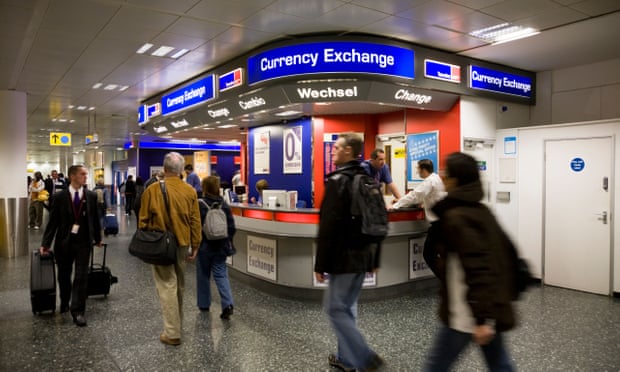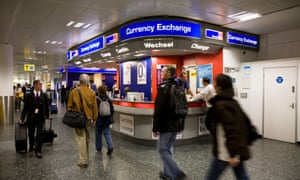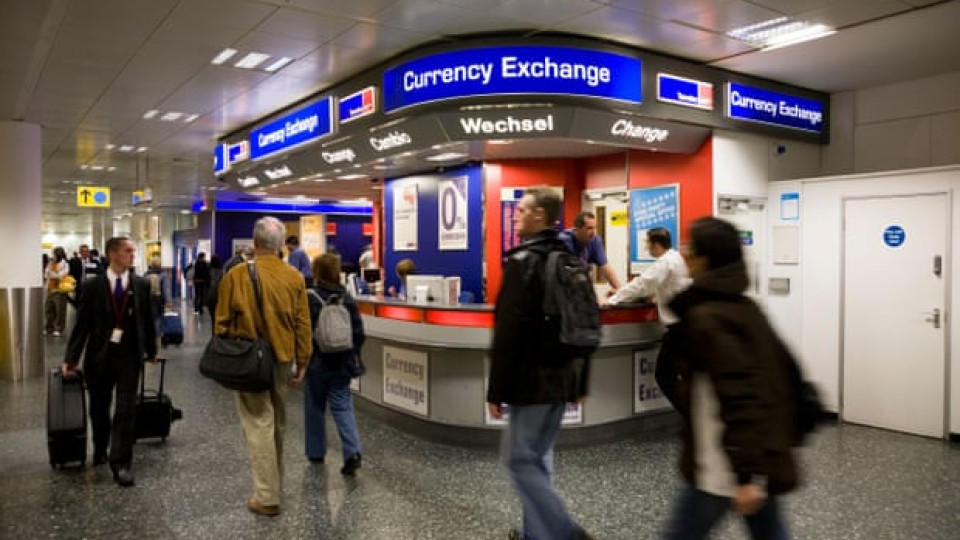
With fears the pound could drop by 10%, the outlook is grim. Should we bank our euros early?

As parents wearily prepare to get the children back to school and face returning to the office after the half-term break, thoughts will inevitably turn to the next holiday … Easter. But for those hoping to get away for a week or two in the sun either then or during the summer, the prospect of a no-deal in Britain’s departure from the European Union could trigger a much more expensive holiday, amid expectations that sterling would plummet in value against the euro.
New statistics from the Post Office suggest that UK consumers tend to buy euros at times of peak political turmoil. They show a 3% rise in the first part of this year – the same time prime minister Theresa May was trying to get her deal through parliament.
So with so much instability ahead, should consumers bank their euros in advance of the holidays?
Where is sterling now?
Although sterling is stronger against the euro than it was at this time last year – by about 2% – it is a long way from where it was just before the referendum in June 2016. Back then, £1 would buy you €1.27. Now, you will get about €1.14, a drop which has remained consistent since the vote.
In the event of a no-deal, the expectation for sterling in many quarters – and thus for UK tourists – is grim. Some analysts have suggested that the pound could drop by 10%. On the other hand, if there is a deal, sterling is expected to strengthen.
As always with currency markets, however, there is no exact science and the reactions of politicians and banking figures will be key.
James Hickman from currency trader FairFx says: “A lot of it is down to the rhetoric that politicians and the Bank of England put on it, such as how hard will a no-deal Brexit impact growth. There are a lot of forecasts out there but the truth is no one really knows.
“Bank of England governor Mark Carney likes to guide the market, and much depends on what he says next. It is a far more complex situation than saying the market will drop by 10% if there is a hard Brexit.”
Earlier this month, during a speech in which he urged MPs to find a solution to the impasse, Carney said no deal would result in an “economic shock” for Britain.
How does this affect holidaymakers?
The drop in value of sterling since the vote has reduced the spending power of the British tourist. For every £1,000 of holiday money you might take to Spain, Italy or other eurozone countries, you get almost €130 less than before the vote – at today’s rates.
Andrew Brown from Post Office Travel Money says the average British tourist spends £800 on a break. If the worst-case scenarios do bear out, this could mean a no-deal would add an average £80.
Should I buy currency now?
While the rates may be poor compared to what has gone before, and there is the possibility that they may improve, buying currency now does give some peace of mind.
“I think security is much better than speculation,” says Hickman. “Most holidaymakers wouldn’t book without knowing exactly what it is going to cost and speculating what might go up and what might go down.
“For peace of mind, I don’t think there’s a downside to buying at least part of your holiday money now.”
There are a number of ways to “hedge” or bank currency now in advance of whatever may come over the next month. Easiest is to use a comparison tool such as MoneySavingExpert to find the best rates and order from there.
“There’s also another nifty trick – a few bureaux let you order currency for collection at today’s rate and, usually for a small fee, cancel or sell it back within up to 45 days,” says Gary Caffell of MoneySavingExpert.
“If the pound weakens, the rate is locked in; if it improves, just cancel the order and buy at the better rate.
“The only downside to buying early is the chance that the pound could strengthen before your holiday, at any time, whether that’s before or after Brexit.
“So if you do choose to buy early, it’s best to close your eyes afterwards rather than let hindsight frustration ruin your holiday.
“But remember, never pay a bureau and let it hold your cash for long – you’re generally not protected if it goes bust.”
Prepaid cards allow you to lock in the rate of exchange now by loading the card with the foreign currency of your choice. Once abroad, you can then spend the money by withdrawing cash from an ATM or using it in the same way as a debit card.
However, financial information firm Defaqto has warned that some prepaid cards have high fees or other catches, such as loading or renewal fees. It adds that many cannot be used for car hire, and customers might also have difficulties at places such as petrol stations.
One straightforward way to settle any concerns of missing out on future rises is to buy half your holiday money now and half later. But whichever way you choose to buy your euros, one golden rule remains – avoid buying currency in the airport at the last minute. In December, some airport exchange bureaux were offering as little as 90 cents for every £1.
Offsetting the problem
For those looking to offset the problems with sterling and get some value for their break, there are ways to save, starting with where you are travelling to. Some currencies are weak against the pound, offering good value for British tourists. South Africa’s rand has been struggling lately, opening up cheaper opportunities. Bulgaria, a low-cost destination for both sun and skiing, has seen an increase of almost a third in the number of holiday bookings this year compared with 2018.
The Guardian












Leave a comment